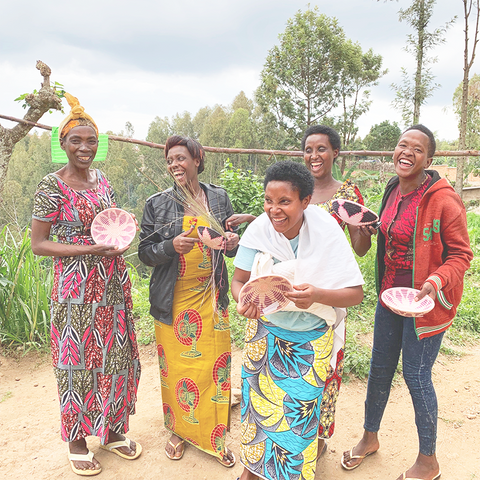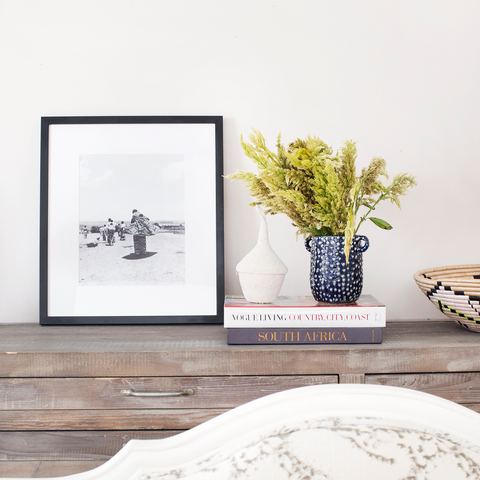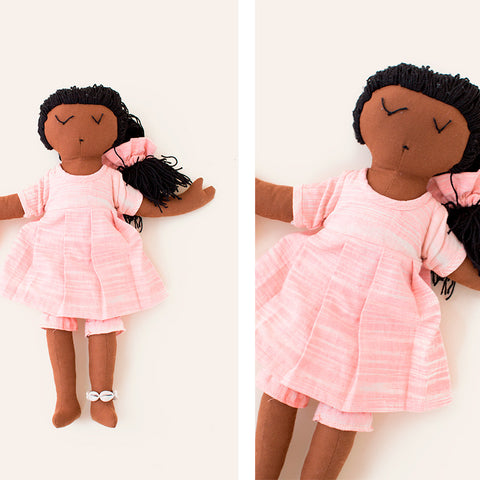At Indego Africa, we believe the opportunity to work and earn a living is one of the most effective ways for refugees to rebuild their lives with dignity.
Since 2007, Indego Africa has helped integrate 1,200+ women and youth into the global artisan economy through job creation and entrepreneurship training.
In 2016, we brought our model to the Mahama Refugee Camp in Rwanda, and over the course of two years, provided 100 Burundian refugees with the vocational training, business education, and international market placement they needed to achieve long-term economic security for themselves and their families.
In December 2018, Indego expanded its Economic Inclusion for Refugees program to the Kigeme Refugee Camp where we began working with a group of 50 Congolese women in need of job training.
Women like Donatha.

“I never had professional skills before to support my life and family. This was my dream since before I became a refugee,” said Donatha. “I am so thankful this opportunity has come my way.”
Donatha Mukarukundo is 48 years old. She, her husband, and her then six children arrived at the Kigeme Refugee Camp in Rwanda in June 2012.
“I didn’t think I would survive as a refugee in Rwanda,” said Donatha. “I remember going back to the transit center when we first arrived and pleading with UNHCR to send me back to the Congo even though I knew it was dangerous. I really thought I wouldn’t survive.”
As the days passed, Donatha started to believe it was possible to make a life, albeit a small one, at the Kigeme Refugee Camp. She gave birth to her seventh child and started selling a few crops in the local market like maize, corn, and tomatoes.
In the Congo, Donatha used to be a successful farmer. Her current operation runs on a very small scale and she often struggles to buy enough food and clothes for her family. Her ultimate goal is to learn a skill she can take with her beyond the camp.
“I have lost almost everything I used to have in my country,” said Donatha. “But a learned skill can’t be lost.”
Enter Igisubizo or “Solution” Cooperative, the name given to the artisan business formed by the 50 female trainees of Indego Africa’s inaugural semester at Kigeme.
“I didn’t know about the cooperative structure until this training,” said Donatha. “I’ve learned so much already. Being a part of Igisubizo is helping me satisfy my basic needs, but it is much more than that.”
With vocational training led by artisan trainers from some of Indego’s top-performing weaving cooperatives in Rwanda, (including Akeza, Indego’s first ever partner cooperative at the Mahama Refugee Camp), the women at Kigeme are learning how to weave quickly AND with quality. Their sweetgrass and sisal plateau baskets will be sold internationally to retail customers on Indego’s website and to wholesale clients across the globe.

One of the most impressive things Donatha has taken away from the training is a sense of independence and self-reliance.
“In the Congo, we relied on our men for most things,” said Donatha. “We sat there and waited. In Rwanda, it is quite different. Women have a voice. I have a voice now to make independent decisions.”
Perhaps it is that newfound confidence that’s contributed to Donatha’s recent success. In January, she was elected by her fellow trainees to lead Igisubizo Cooperative as its president.
As she gets older, Donatha knows she won’t be able to run to the markets every day to sell her goods. Working in an artisan cooperative with other women is giving her a new direction in life.
“Having the ability to weave baskets represents a heritage,” said Donatha. “These skills are a legacy to leave to your children, family, and friends. I want to weave because I want to know I am making an impact in my family’s daily life.”
Donatha is excited by the prospect of her baskets reaching international clients.
“It means elevating my skills, earning money, and taking my family to the next level,” said Donatha.
On February 5th, just eight weeks into their training, the women of Igisubizo were paid 259,000 RWF ($305 USD) for their very first purchase order. Before joining the cooperative, only 72% of the trainees were earning any income at all. Those who were earning income, did so sporadically, bringing in an average of 5,695 RWF ($6.70 USD) per month.
As president, Donatha ensures the money Igisubizo earns from each purchase order is deposited into their cooperative bank account at the Bank of Kigali. The women save 10% of sales and distribute the remaining earnings equally among all members. By the end of March, Indego Africa plans to help each individual woman set up her own bank account with Bank of Kigali – a major achievement for refugees who are traditionally excluded from accessing formal financial services.
After mastering their first two mini plateau designs, the women of Igisubizo are moving on to three more sophisticated designs for full-size plateau baskets. In the future, Donatha hopes to train other women how to weave. She previously helped other people in her community manage their small businesses.
“When I’m happy, I also want my neighbors to be happy,” said Donatha. “I want to be an agent of change to help those who need it.”
***
We are grateful to UN Women whose generous support has been crucial to the success of our Economic Inclusion for Refugees program at the Kigeme Refugee Camp in Rwanda.



